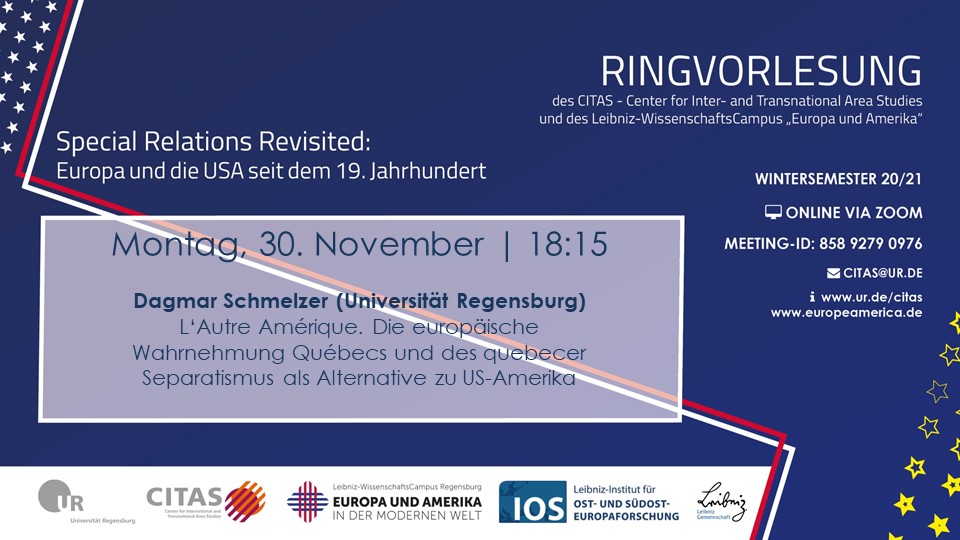Lecture Series: L'Autre Amérique (Dagmar Schmelzer)
In her lecture for the "Special Relations Revisited" series Dagmar Schmelzer explores Francophone Canadian identity and its transnational dimensions and relationship with Anglophone North America. This lecture will be held in German.
L'Autre Amérique. Die europäische Wahrnehmung Québecs und des quebecer Separatismus als Alternative zu US-Amerika
Die frankophonen Kanadier, canadiens français, definierten ihre Identität von jeher kämpferisch, im Gestus der Selbstbehauptung eines „petit peuple“ gegenüber den Weiten des amerikanischen Kontinents – und dies naturräumlich wie kulturräumlich, in Konkurrenz zur anglophonen Übermacht im Süden. Die Konfliktlinie frankophon/anglophon bestimmte dabei historisch nicht nur die Abfolge der kolonialen Abhängigkeiten und später die quebecer Politik im Inneren der Provinz und gegenüber Kanada, sondern auch die Frontstellung gegenüber dem U.S.-Einfluss, zumal die Grenze zu den Vereinigten Staaten sich in mancherlei Hinsicht als permeabel erwies. Setzten die Quebecer als „français améliorés“ (Lionel Groulx/Duplessis) dabei traditionell durchaus auf ihr französisches Kulturerbe, ihre „francité“, positionierten sie sich in Einforderung ihrer „américanité“ zunehmend auch als „l’autre Amérique“, ein Amerika, das z.B. in Sachen Sozialpartnerschaft und Wohlfahrtsstaat eigene Standards bevorzugt und auf ein verschiedene Einflüsse und Vorbilder amalgamierendes „modèle québécois“ (Dupuis) als Alternative setzt.
Speziell in den „années 68“, in denen im Zuge von Wertewandel und Protestbewegungen in Québec auch separatistische Stimmen lauter wurden, ist die transnational ausgerichtete, spannungsreiche Selbstpositionierung der Identitätsdiskurse auffallend. Auf der Weltausstellung 1967 in Montréal gibt sich Québec ein welt- und zukunftsoffenes Bild. Viele der Nationalisten, die die Unabhängigkeit der Provinz einfordern, schließen an tiersmondistische und kapitalismus- und damit auch U.S.-kritische Identifikationsmuster an und suchen in transnationalen linken Befreiungsbewegungen Anschluss. Besonders kontrovers, aber auch besonders plakativ, ist Pierre Vallières Bild der Quebecer als „nègres blancs de l’Amérique“, mit dem er im Kampf gegen die soziale Benachteiligung des frankophonen Proletariats den Schulterschluss zur Black-Panther-Bewegung sucht.
Der Vortrag stellt einerseits anhand verschiedener Beispiele dar, wie die quebecer Identitätsbestimmungen in einem transnationalen und transatlantischen Spannungsfeld, zwischen Europa, Francophonie, Drittweltismus und anglophonem Amerika stehen und geht andererseits der Frage nach, ob und wie diese Identität in Frankreich und Deutschland als „anders“ und eigen wahrgenommen wurde.
L‘Autre Amérique. European Perceptions of Québec and Québecois Separatism as an Alternative to US-America
Francophone Canadians, canadiens français, have traditionally defined their identity in terms of struggle. This offers a gesture of self-assertiveness by the petit peuple in the face of the vastness of the North American continent – seen both as a natural and as a cultural space – where the French-speaking groups see themselves as being in the competition with the Anglophone great power to the south. The battlelines between the Francophone and Anglophone emerged not only as a result of colonial dependencies or the subsequent policies of the Québec region, likewise towards the rest of Canada, but also as a means of putting up a front against US influence, especially because the border to the United States proved to be quite permeable in many respects. While the Québecois, as “français améliorés“ (Lionel Groulx/Duplessis), stressed their French cultural heritage, their francité, they increasingly framed demands to show their americanité within the framework of l’autre Amérique, an America that in respect of social solidarity and the welfare state, set its own standards. This America, then, was one that was based on the alternative vision of the amalgam forming the “modèle québécois“ (Dupuis) that drew on various influences and examples.
It is in the années 68 in particular, in the course of which changes in values and protest movements in Québec also saw separatist voices grow louder, that the transnationally-oriented and contested self-positioning of identity discourses becomes especially evident. The 1967 International and Universal Exposition (Expo 67) in Montréal allowed Québec to present itself as open to the world and the future. Many of the nationalists who demanded independence for the region adopted Third-Worldist, anti-capitalist and, therefore, anti-American models of identity, meaning that they thus sought to build alliances with left-wing liberation movements. Particularly controversial but also somewhat simplistic was Pierre Vallières’ image of the Québecois as “nègres blancs de l’Amérique”, which led him to seek an alliance with the Black Panther movement as part of the struggle of the Francophone proletariat against social inequality.
This lecture draws on various examples to show how Québecois definitions of identity were positioned in a network of transnational and transatlantic relations that spanned Europe, the French-speaking world, Third-Worldism and Anglophone America. It considers, furthermore, whether and, if so, how this identity was perceived as both Other and familiar in both France and Germany.
Dagmar Schmelzer is senior lecturer (Akademische Oberrätin) at the Institute for Romance Studies at the University of Regensburg. Her research interests include intermediality, travel writing and autobiography, as well as Spanish- and French-language literature and culture since the nineteenth century.
When? Monday, 30 November 2020, 18:15
Where? Online via Zoom, https://uni-regensburg.zoom.us/j/85892790976, Meeting ID: 858 9279 0976
The lecture series "Special Relations Revisited: Europa und die USA seit dem 19. Jahrhundert" investigates how transatlantic relations have changed over the past 200 years. It is organized together with CITAS. Find the full programm here.

